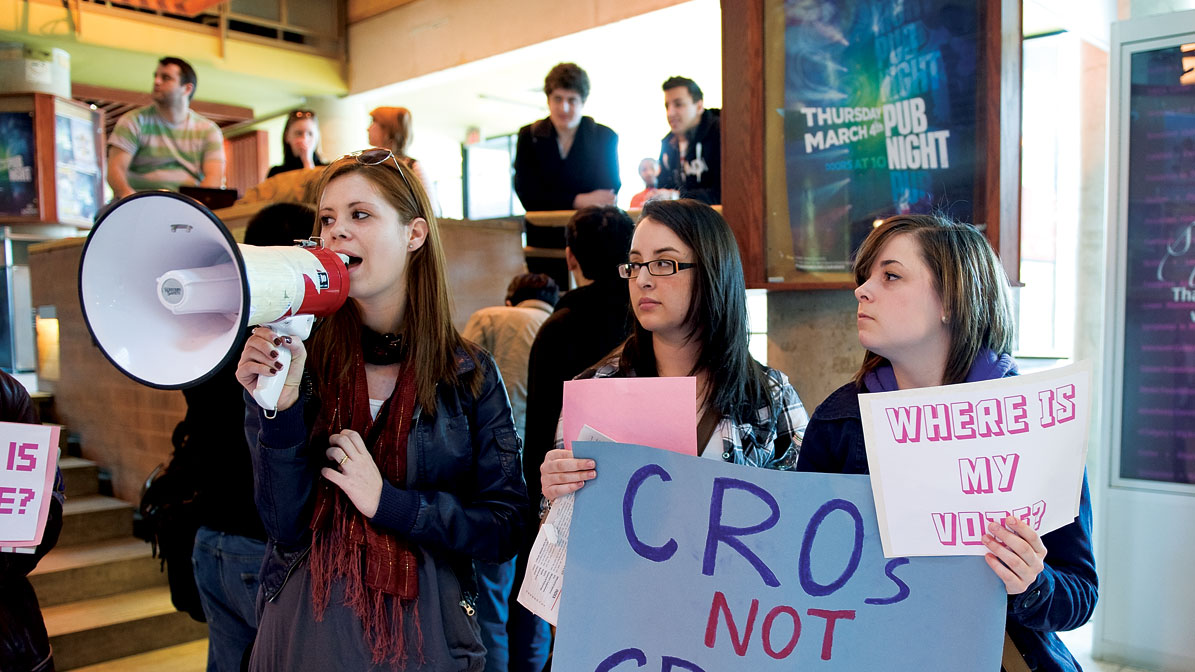Nicholas Maronese
Editor-in-Chief
A Dec. 10 meeting saw close to 150 students voting on several controversial motions that will dictate the course of action the York Federation of Students (YFS) will take in the winter semester.
The high turnout for the student government’s Annual General Meeting (AGM) was particularly surprising considering posters for the event read “location: TBA” [‘to be announced’] the day before it was held in Vari Hall B.

The AGM is an annual meeting hosted by the YFS. All members of the student union – including all undergraduate students at York – can vote on and propose changes to the federation’s by-laws and regulations regarding future campaigns.
Some of the most controversial motions brought forward included the hotly debated changes to the YFS elections procedures. Also on the agenda was a startling new proposal that, under the heading “New Student Centre,” called for a massive expansion to the York University Student Centre (YUSC), because the current facility “no longer meets the needs of York students.” [See adjacent articles on these pages.]
After much discussion, however, these motions, like almost every other motion at the meeting, carried nearly unanimously, with almost every voter card raised in favour of the proposed changes.
Debate on the motions that followed the elections changes and Student Centre expansion dropped off significantly, in part due to the fact that about half of the voting body suddenly left the room immediately after those two issues were resolved.
Motions to encourage the university to reduce its use of eggs from factory farms and for the YFS to host a “Lyme Disease Awareness Initiative” received little fanfare, though a proposal to tack a $6 fee onto students’ tuition to fund the “Poverty Eradication Project” drew some criticism.
The motion specifically noted that the YFS would support the newly formed Human Rights, Participatory Growth and Poverty Eradication Committee’s efforts to host a referendum to make the fee a reality. They referred to the passing of a similar referendum held this past year at Carleton University.
When collected, the annual $6 fee adds up to over $300,000, a sum which the YFS proposed students use to fund a “Millenium Village” in sub-Saharan Africa.
However, some students suggested that part of those funds should be used to help impoverished York students. One student suggested the $6 levy be split evenly between the Millennium Village and an at-home poverty eradication initiative, while others were concerned with the difficulty in tracking exactly how those funds would be used abroad.
A final amendment from a student who begged that at least $1 from the fee be diverted to help York students was rejected, and the motion passed to much applause.
Other amendments to the by-laws included the removal of the Osgoode Hall Law School director from the federation’s council, who will now be part of and represent the Graduate Students Association (GSA). Contrarily, director seats for representatives from the newly formed faculty of liberal arts and professional studies and New College were added.
48 – Number of YFS elections changes recommended by McCamus report and Davis LLP audit.
40 – Number of YFS election changes adopted by the recent YFS general meeting.
New changes made to YFS bylaws and practices


